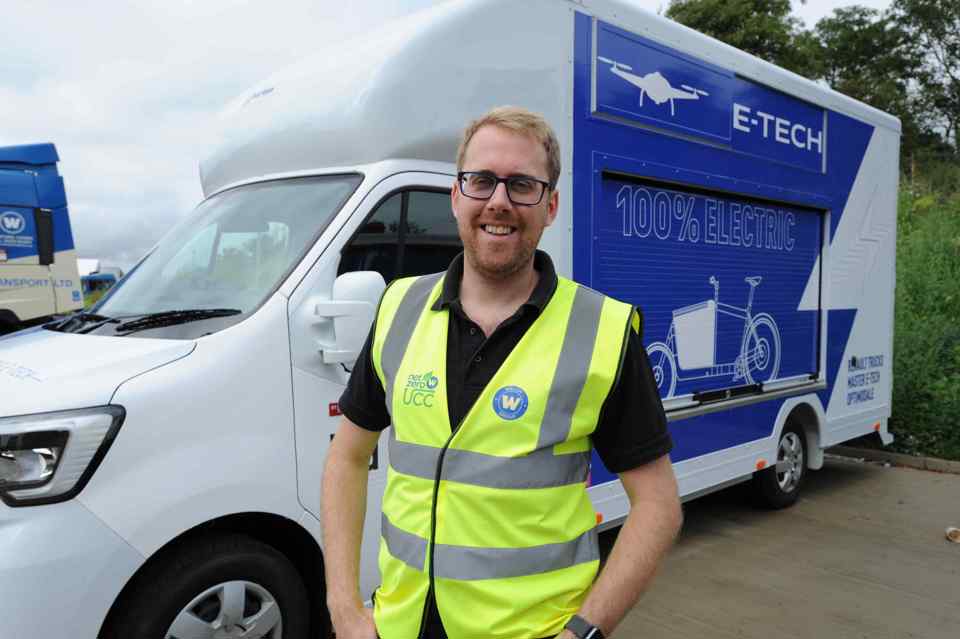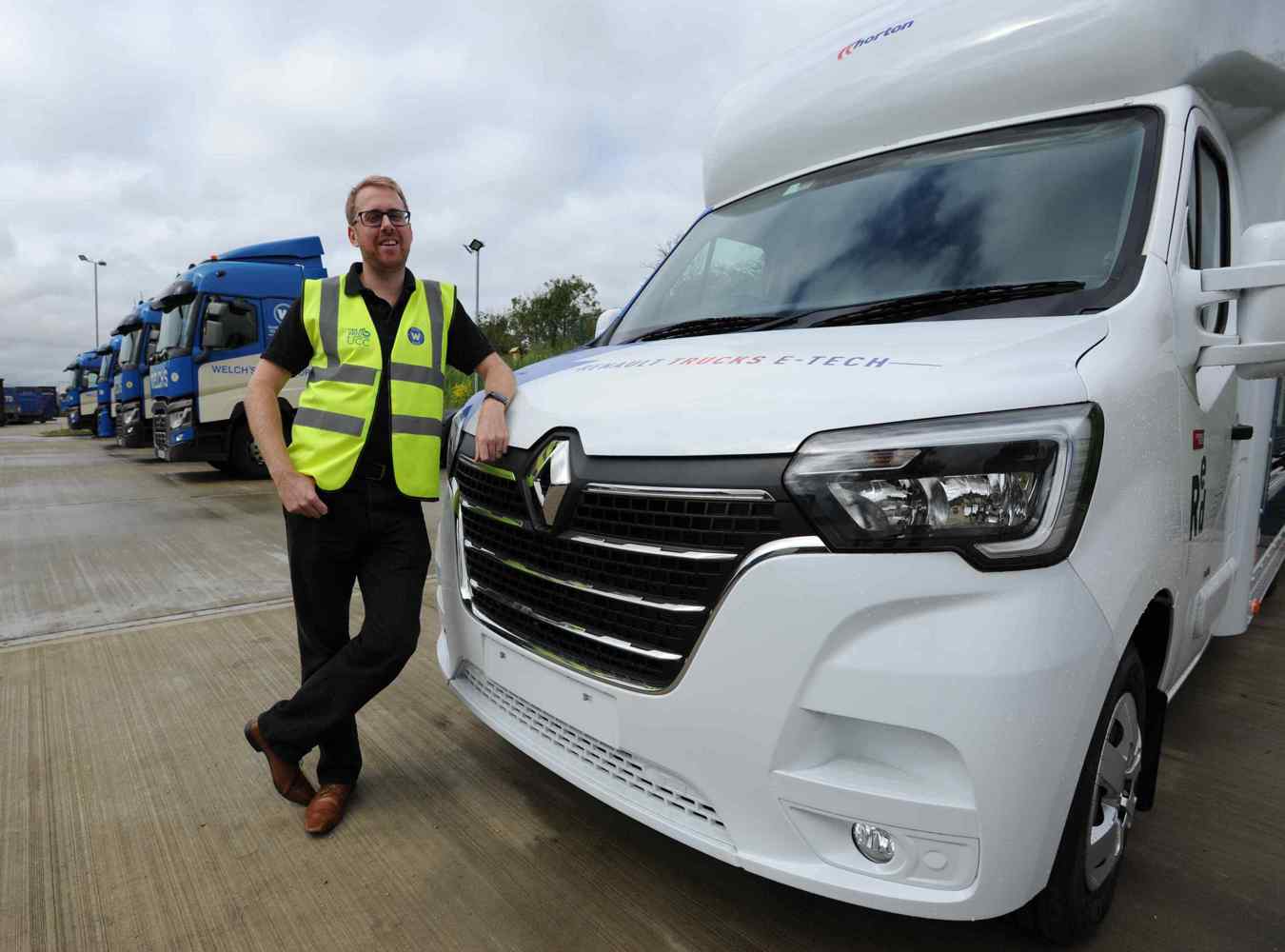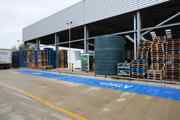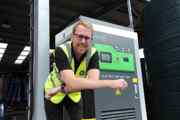Family businesses can often be perceived as cosy, sedentary organisations, delivering great customer service, but slow to jump on the latest trends and embrace the newest technology.
Nowhere does this ring truer than in the transition to electric. Many small firms are stalling, even when presented with the open goal offered by 2% benefit-in-kind on zero-emission cars. Don’t even mention the trickier proposition of vans. And trucks? Well that’s a real fingers-in-ears moment.
Welch’s Transport blows all these perceptions to smithereens. The family-owned company, which celebrates its 90th birthday next year, has a fierce heritage of innovation and prides itself on being in the vanguard of new initiatives.
In the hands of fourth generation Chris Welch, commercial and operations director, it has someone with a passion for protecting the planet, who is determined to leave his mark by creating a sustainable business that benefits both the environment and the bottom line for generations to come.
That’s no mean feat when the bulk of your fleet consists of 74 trucks - a mix of 44-tonne artics and 26/18-tonne rigids.
Net zero and the company's first electric truck (with solar panels)
Welch, affectionately known in the business as ‘Captain Planet’, is the stimulus behind the company’s net zero strategy. Introduced earlier this year, it has already seen Welch’s first electric truck, a 19-tonne Renault E-Tech D, brought onto the fleet.
The company has also opened an Urban Consolidation Centre (UCC) in Duxford, near Cambridge, using a template first conceived for the London Olympics in 2012, and it has installed a 150kW supercharger which is available for other fleets and the public to use.
Chris Welch hopes other businesses will follow his lead to create a national network of workplace chargers geared up to accommodate trucks, which have been largely neglected by the public charging network.
“We are helping to start the infrastructure with our partners and peers, but also with councils who can charge their bin lorries here,” Welch says. “We can get to a position where we have chargers across the country for businesses to use.”
Fleets book the charger via an app, then simply plug in and start charging. With the supercharger currently used by Welch’s for just 90 minutes at night, there is plenty of capacity to accommodate other vehicles.
Three catalysts led to the creation of Welch’s net zero strategy.
The journey started with a demo vehicle of the Renault E-Tech D, which is powered by four 66kW battery packs located in the wheelbase. Welch immediately saw the potential and placed an order in April 2022.
At the same time, he wanted his Renault Truck dealership, which sits adjacent to the UCC, to be the first in the country to be able to service and maintain electric trucks.
The third incentive was provided by location. Welch’s distributes into Cambridge which has its own net zero agenda – although its plans to introduce a London-style emissions-based congestion charge were recently voted down by councillors.
The UCC, which opened earlier this year, is a key part of the strategy to reduce local emissions and helps to unlock the potential of electric trucks.
It will reduce the number of vehicle trips by up to 46% and underpins the last mile distribution strategy, particular on the science parks which nestle the city centre.
“We can either drive our electric truck right into the park or have a micro consolidation centre where electric vans and e-cargo bikes deliver the last metre,” Welch explains.
“We haven’t ruled this out, but it does depend on the appetite of the customer and the volume of freight. We ate trialling the Freegônes e-cargo bike and can see the use cases.”
Underlining his pioneering spirit, Welch wanted to be the first business to take on the Renault E-Tech D; he ended up being the third after a series of setbacks caused by delays with the bodybuilder.
Although the trucks can travel 140-150 miles on a single charge, Welch plans for 130 miles “to remove any range anxiety” but is also double running on some radial routes with a scheduled charge in the middle of the day.
Drivers self-nominated and the business selected two – a main driver and holiday cover.
Feedback has been positive, with both drivers enjoying the instant torque and quiet performance.
“It changes the way they drive to be more economic, but electric also makes it easier for drivers to be efficiency, especially with the regenerative braking,” Welch says.
Analysis has revealed that, so far, that truck is recouping 87% of its energy. “For every 100 miles, we get 23 for free,” Welch says. “We are seeing 0.72 miles per kWh.”
He adds: “It’s also been great for our truck centre when we can show our customers our own electric truck – it’ll help them to make the move as well.”
Solar panels on the E-Tech D’s roof – a standard option from Renault – charge a second battery which powers the auxiliary equipment, such as the tail lift.
Welch’s believes in ownership and self-control.
It buys all its trucks, vans and cars outright and carries out all its own refurbishments which gives it a lot of flexibility over operating cycles.
It has written the electric truck off over eight years, although the battery warranty is for six. It is considering extending the replacement cycle but is also keeping an eye on the used market to exploit any strengthening in values.
“We expect the vehicle to be looked after so we don’t expect it to degrade as much as diesel,” Welch says. “We might have to refurbish after six or seven years but it will be good to go for much longer. It may be like coaches, which run for 10-12 years.”
He adds: “People are too hung up on battery degradation, like 80% after a few years. When you operate vehicles that have a low range, it makes little difference. And you can replace any cells that fail one at a time.”
Benefits provided by the used truck market
Welch believes the used market will offer a big opportunity, particularly as the UK edges closer to the 2035 ban on diesel trucks up to 26 tonnes (2040 for everything heavier).
“Not everyone can buy new, but they will buy second hand and I think there will be demand for an electric truck after 10-12 years even with 80% of the range,” he predicts.
Being an early adopter is not without its challenges. Welch’s has already changed one of the four battery cells on the Renault, at the cost of £34,000. On the upside, it was completed within a day; for comparison, another truck had a fuel injector issue and that was in for a week.
“The electric trucks will have fewer small jobs like oil and filters, but they are likely to have bigger jobs, such as wiring looms,” Welch says.
It has implications for the total cost of ownership but were absorbed into the return on investment (ROI) calculations thanks to a 25-30% saving on mileage over six-to-eight years. Then the energy prices surged, which threw everything into disarray.
“Now, if we charge during the day, it costs more than diesel. But if we charge on our night tariff, it’s about the same,” he says.
“We basically need £100-120 more revenue per day to have the same margins as a diesel truck, but if we double shift then it just about washes its face.”
Ever resourceful, Welch is already working on a solution: solar and wind. Phase one, next month (October 2023), will see panels fitted to the truck centre that are capable of generating 100kW. It will save the company around £1,800 a month on its electricity bill.
The UCC will be fitted with solar panels next year which will add another 300kW, while the final phase will see the installation of a 265kW battery storage system. Welch has calculated the ROI to be less than one year.
“The truck averages 130 miles a day which needs 220kW every night,” he says.
“We can pull that off the solar and store it. If we over-produce, we can feed it back to the grid if required – it’s basically a hedging system for electric.
“We estimate we can produce a third of the electricity that a full fleet of electric trucks would require. This is where the commercials behind the vehicle start to stack up.”
The company is also assessing the ROI for installing wind turbines, which would give it year-round ability to generate electricity.
“We can get four or five wind turbines on the roof which will give us the opportunity to be self-sufficient,” Welch says.
Complementing the twin-plug 150kWh supercharger, which takes 90mins to fill a truck to 85%, will be a row of 12-15 22kWh ‘juice boosters’ for overnight charging.
A second supercharger has not been ruled out.
Overcoming insurance company nerves
The main challenge here is the fact that insurers don’t like the idea of trucks being next to each while charging.
Welch is, of course, working on a solution.
While the solar and wind options provide a valuable supplementary source of electricity, Welch showed foresight when developing the UCC by installing a half-megawatt substation to futureproof the site’s electric demand.
“We knew where we were going to go,” he says. Even so, he may eventually need to upgrade the grid input as the fleet transitions to electric.
“Energy Saving Trust road mapped us for the future. On our busiest day, we would be only 15% deficient in our energy,” Welch says.
With 74 trucks, of which 40 are located at the Duxford UCC, the company has some way to go to achieve its net zero aspiration, but Welch predicts he will be running five or six electric Renault D trucks within the next two years. He will be trialling the Volta 16-tonne truck in October for two months and a 40-tonne BEV at the end of next year.
Why BEV will trump hydrogen
Interestingly, Welch believes BEV is the future for trucks, not the much-mooted hydrogen fuel cell, because you can control the power source by exploiting solar and wind energy.
Plus, as he points out, hydrogen is simply an electric vehicle powered by hydrogen.
“But it means more wires, you have the hydrogen fuel cell, the tank itself – it makes it more complicated,” says Welch.
Expansion of the BEV truck fleet will be timed to match customer demand, but Welch’s will press on with the vans at pace as their daily 120-mile journey profile fits the BEV template.
The vans are typically recovery vehicles, parts vehicles and escort vehicles with a few 3.5-tonne flatbeds. They will switch to Renault E-Tech Masters. The eight-strong car fleet is also moving to full electric.
One of the reasons why Welch is so confident the electric trucks will have a long life is the company’s one vehicle per driver policy: it’s ‘their’ truck which encourages accountability and ownership. In addition, they are well equipped to ensure drivers travel in comfort, which gives them a better resale value at end of life.
This policy also has risk management benefits, which are strengthened via an in-house driver trainer, who also does post-incident investigations and assessments, four-star Direct Vision Standard vehicle ratings and technology, including telematics and three cameras (forward, rear and offside).
The power of AI
Welch is also looking at AI (artificial intelligence) cameras which can distinguish between vehicles, people and inanimate objects.
All drivers undergo an assessment prior to being offered a job and then have an induction day and another assessment once they have joined. On their second week of employment, they go out on their route with the driver trainer before being passed onto a driver mentor who offers further support and guidance.
Each year, drivers attend a Driver Communications Day (DCD) where they are taught about risk, technology and economic driving and have further assessments with the trainer.
Six years ago, Welch took the decision to stop employing agency drivers because of the amount of time it was spending training them up to its standards.
“It was one of the smartest things we’ve done,” Welch says. “It has improved efficiency, safety, planning and execution of the plan. It has also improved the culture and reduced sickness. And insurers prefer it.”
Gaps in the employee base – both driver and technicians - are filled via its own apprenticeship programme, which was launched in 2015.
It’s yet another example of foresight and how the industry could resolve its own challenges if businesses took a more holistic view and worked together.
“If everyone used their levy and did apprenticeships, there would be no gaps and no need to worry about them leaving once qualified,” Welch says.
The company takes on one apprentice technician a year on the three-year programme and up to six truck apprentices on the 12-month course. It retains around 30% of drivers and has never lost a qualified technician. Almost a fifth of its staff were apprentices.
Welch’s safeguards its investment via a training levy of £1,800 which remains in place for five years.
Each year worked, 20% is knocked off (£360).
This provides some protection but is not a big burden for newly qualified staff who could expect to earn £40,000 per year as a 20-something technician and up to £50,000 as a long-haul young driver.
“It’s a trade with skills that are transferable in other businesses and other depots,” Welch says.
“I go into secondary schools to talk to kids about the industry and all the options. They often think they have to go to university. But they could be earning a lot of money at a young age if they join our industry!”
WELCH'S FACTFILE
- Company: Welch’s Transport
- Head office: Duxford, Cambridge
- Commercial and operations director: Chris Welch
- Fleet size: 90 vehicles (35 tractor units, 10 26-tonne rigids, 10 18-tonne rigids, 19 7.5/12-tonne rigids, 8 3.5-tonne vans, 8 cars)
- Funding method: outright purchase
- Operating cycle: trucks – six years

































Login to comment
Comments
No comments have been made yet.